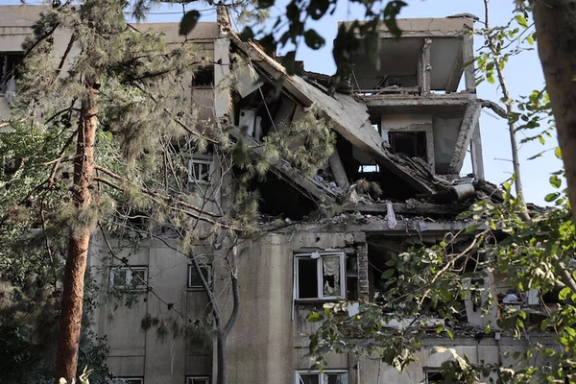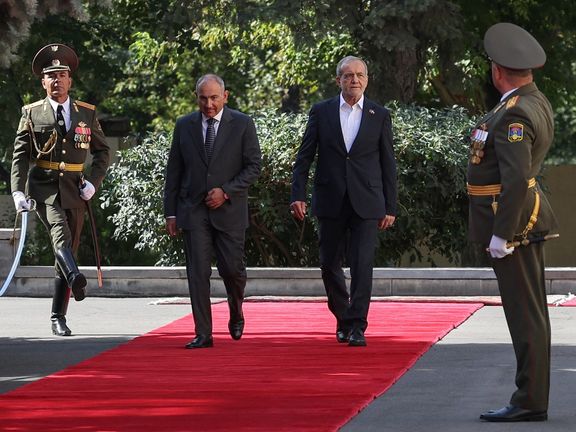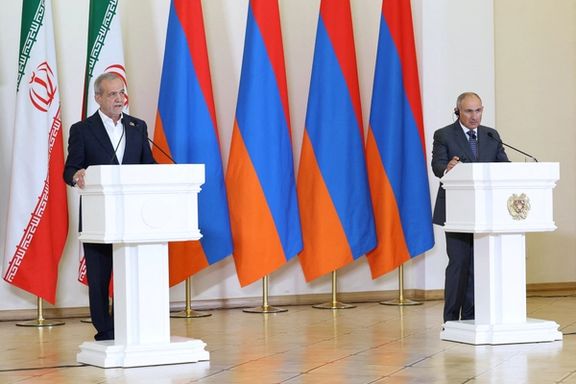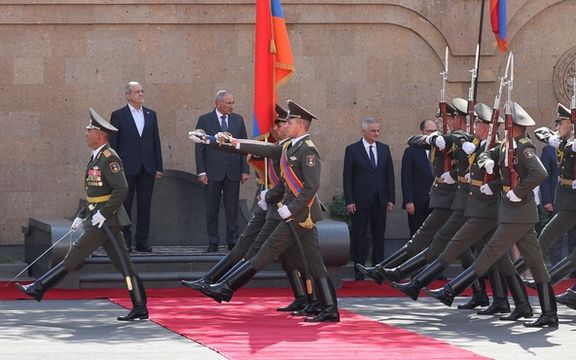Since June 24, officials and state media in Iran have repeatedly described the incidents as ordinary accidents, often blaming gas leaks, electrical faults or waste fires.
While pledging that investigations would reveal the causes, they have consistently denied any link to Israel.
The blasts came in the middle of summer, a season when gas use is at its lowest. Some fires broke out near military facilities.
The sudden death of Ali Taeb — a former representative of Supreme Leader Ali Khamenei at the Sarallah Headquarters, a key Revolutionary Guard security command — deepened doubts.
The authorities’ official explanation has sparked a wave of jokes on Iranian social media.
What types of sites were hit
Of the sites affected, about 30 percent were commercial, 24 percent residential, 16 percent industrial, 14 percent military, 10 percent public facilities, and 6 percent of unknown use.
The peak came on July 14 with four incidents. Tehran province had the most overall with 15, followed by Hormozgan with five, Khorasan Razavi with four, East Azarbaijan and Alborz with three each, five provinces with two, and nine provinces with at least one.
Explosions and fires from June 24 to June 30
The first case after the ceasefire was on June 24, when a residential unit in Kermanshah’s Karnachi district exploded. Officials blamed a gas leak.
On June 25, another residential unit in Tehran’s Jannatabad district was destroyed, also officially described as a gas explosion in an unfinished building.
The same day, another explosion occurred on Hedayat Boulevard in Mashhad, likewise blamed on gas. That evening in Dezful, residents reported powerful blasts. Military officials said they were caused by the destruction of old munitions.
On June 26, flames poured from a unit in the Aseman Tower in Tehran’s Farmanieh district. Given the recent targeting of military and security officials during the 12-day war, doubts grew. No clear cause was ever announced.
The same day, an explosion and fire were reported at Tabriz refinery, northwest of Iran. In an unusual move, the IRGC’s Ashura unit issued a statement blaming a nitrogen tank replacement.
In Urmia, another explosion was reported near the airport and again it was attributed to the disposal of munitions.
Around the same time, residents in Tehran’s northeast, near Shahrak-e Mahallati, and in Hamedan, reported powerful blasts. Both were officially described as air defense tests.
Explosions and fires from July 4 to July 14
On July 4, a huge fire engulfed the Noor shopping center in Qeshm Island, destroying at least 200 stores. Its scale required 130 firefighters from several towns.
On July 5, an explosion was reported near the Istak factory in Sanandaj, attributed to a battery warehouse.
On July 7, repeated blasts were heard in western Tehran, with no official explanation. On July 9, a fire struck workshops in Khalazir, west of Tehran.
That night, Bandar Abbas’s main bazaar, the Hormozgan Mega Mall, burned.
On July 10, an explosion destroyed a unit in Pamchal-9 Tower in western Tehran. Witnesses reported seeing a projectile, and security forces quickly sealed the site.
Officials called it a gas blast, but the tower had no gas piping.
The next day, the death of Taeb was announced.
On July 14, residents in Damavand reported explosions and glowing objects in the sky, which officials again described as an air defense test.
The same day, thick smoke rose near Roshandelan Bridge in Tehran, with firefighters attributing the blaze to a shoe workshop.
In Karaj, a blaze destroyed a furniture workshop. In Mashhad, smoke was seen near the airport, blamed on grass burning.
In Qom’s Pardisan district, a blast tore through an apartment complex, injuring seven and damaging surrounding buildings.
The images resembled Israeli strikes on high-profile figures during the 12-day war. Officials said it was a gas leak.
Explosions and fires from July 14 to July 20
On July 15, a fire broke out at Mashhad’s Qaem shopping center, which officials linked to the building’s age, while Tabriz’s Zomorrod Tower also caught fire with no cause given.
In Tehran’s Esfahanak district, a five-story apartment block with 60 units burned, blamed on a car fire in the garage.
On July 16, a blaze hit Baghlarbaghi park in Tabriz, said to be caused by an amusement ride engine.
On July 17, smoke rose near Barekat Hospital in Tehran’s Chitgar area, blamed on a garbage depot fire.
On July 19, an explosion at Abadan refinery was blamed on a pump leak. That night, a 30-story residential tower in Tehran’s Kharrazi district caught fire, blamed on a faulty air conditioner.
The same day, smoke was seen on Neauphle-le-Château Street in Tehran, near the Italian Embassy, which officials said was caused by burning waste.
On July 20, Yazd’s Mehriz industrial park was engulfed by flames, while a residential-commercial building in Rasht burned, leaving 18 injured.
Explosions and fires from July 21 to July 26
On July 21, a major fire struck Kharazmi industrial park in Alborz province. The same day, a petrochemical plant near Ziar in Isfahan exploded, burning 1,500 square meters.
On July 22, Anzali Free Zone’s Venus shopping mall caught fire, injuring 16. The same day, Qeshm’s Dolphin Mall also burned. In Qom’s Fatemieh district, an explosion destroyed a home, which officials said was caused by a water heater.
On July 23, fire swept through workshops at Isfahan’s science park.
On July 25, Bandar Abbas’s old bazaar burned.
On July 26, a large fire hit Mahdis Hypermarket in Mazandaran’s Qaemshahr.
Explosions and fires from July 28 to August 11
On July 28, another blaze swept Qeshm’s Persian Gulf-2 mall.
On July 31, a fire broke out at a furniture workshop in Nasirabad industrial park near Robat Karim, which officials attributed to an electrical fault. The same day, flames were reported in Kermanshah, officially blamed on a water company depot, while in Mashhad a fire near Qaem hospital was said to have been caused by burning trees.
On August 4, a dormitory on Tehran’s Enghelab Street caught fire, which officials attributed to a neighboring carpentry shop. The same day, flames spread across Shiraz’s Derak mountains, blamed on careless hikers.
On August 6, a blaze swept through the Aliabad industrial zone in Tehran. Two days later, on August 8, an explosion struck a scrapyard in Gachsaran.
On August 9, a fire broke out at Anzali’s Caspian shopping mall and at warehouses in Saveh’s industrial zone, destroying motorcycles and storage for paper and wood. In Mehran, near Iran’s western border with Iraq, an explosion destroyed a tent for Arbaeen pilgrims, which officials blamed on a gas cylinder.
On August 11, residents of Savojbolagh district in Alborz province reported blasts and a fire in the Hiv mountains, which officials blamed on careless hikers.
Although officials have attributed the incidents to causes such as gas leaks and accidents, their number, timing after the 12-day war, and proximity to sensitive sites have prompted continued public questioning.








